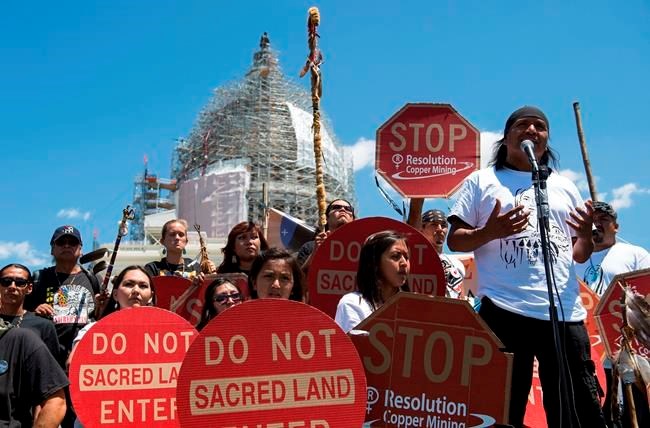FLAGSTAFF, Ariz. — The U.S. Forest Service released an environmental review Friday that paves the way for the creation of one of the largest copper mines in the United States, against the wishes of a group of Apaches who have been trying for years to stop the project.
The Forest Service now has 60 days to turn over a tract of land in Tonto National Forest east of Phoenix to Resolution Copper Mining, a joint venture of the international mining companies Rio Tinto and BHP.
Environmentalists contend the Forest Service was pressured to push the review over the finish line before President Donald Trump leaves office, complicating their efforts to reverse the land swap.
The Forest Service said that's not true, while the mining company contends the publication already was delayed by months.
The mountainous land near Superior, Arizona, is known as Oak Flat or Chi'chil Bildagoteel. It's where Apaches have harvested medicinal plants, held coming-of-age ceremonies and gathered acorns for generations. An area where dozens of warriors leapt to their deaths from a ridge adjacent to the proposed copper mine, rather than surrender to U.S. forces during westward expansion, is protected as a special management area.
A judge late Thursday denied a request from Apache Stronghold, a group led by former San Carlos Apache Chairman Wendsler Nosie Sr., to halt the publication until a larger question over who legally owns the land is settled.
U.S. District Court Judge Steven Logan in Phoenix said he recognized “the anxiety that having one’s sacred land taken from them and used for purposes that run counter to their spiritual beliefs, might cause.”
But Logan said the Forest Service and other defendants also have a right to respond to the allegations, and he saw no proof they had been served. He set a Jan. 27 hearing.
Nosie's group alleged violations of religious freedom and
Nosie said he's hopeful the court or politicians will take action to preserve the area as it is.
“I think with a new Congress, new administration, they will be able to take a new look at it based on the Constitution, our religion and based on the consequences of having this mine that's looking to devastate and destroy this area forever,” Nosie told The Associated Press.
The land swap was approved in December 2014, quietly tucked into a must-pass
Arizona Gov. Doug Ducey on Friday said the mine will ensure a reliable supply of up to 1 billion pounds of copper annually. “Arizona has a long history of responsible mining, showing that we can have a robust mining sector while protecting our environment and cultural history,” he said in a statement.
Resolution Copper is set to receive 3.75 square miles (9.71 square
U.S. Rep. Raul Grijalva of Arizona and Sen. Bernie Sanders of Vermont, both Democrats, tried unsuccessfully to reverse the land swap. Grijalva said this week that it remains one of his top priorities.
“I'm hoping to put the brakes on it and reexamine every step,” he told The Associated Press. “I think part of the oversight I want to do is what was this cozy relationship between the international mining company, their subsidiary Resolution and the Trump administration.”
Randy Serraglio with the Center for Biological Diversity called the move to transfer Oak Flat “an outrageous act of corruption and a callous betrayal of Native people who value that land as sacred.”
Resolution Copper said it has spent about $2 billion so far to gain access to the mine and conduct studies. More time and money will go into securing permits and constructing the mine, which wouldn't begin operating for at least 15 years.
The company said it has committed to spending $100 million for cultural heritage and recreation projects, among other things, to help ease the effects of mining. It has tweaked its plans after receiving input from other tribes, some of whom have members who were hired to help inform archaeological surveys.
Resolution Copper project director Andrew Lye said the company is committed to engaging with tribes and will seek consent from them before it makes any decisions on developing the project.
The Oak Flat Campground would remain open to the public until it's no longer safe for people to go there. Eventually, the mine would swallow it.
The project proposal calls for the use of block caving, a method Resolution Copper maintains is safe and environmentally sound, to extract the remaining ore from depths as much as 7,000 feet below ground. Through this method, ore is selectively mined in a controlled way as the ground underneath it collapses under its own weight.
Resolution Copper has said the mine could have a $61 billion economic impact over the project’s 60 years and create 1,500 jobs — points that supporters repeatedly have stressed.
“Not only will Resolution Copper be a major employer, but it will lead to construction activities and new commercial development, such as housing, hotels and retail,” Glenn Hamer, the president and chief executive of the Arizona Chamber of Commerce and Industry said in a statement.
Environmentalists and Native Americans are concerned about the toxic waste that would be dumped on nearby wildlands, the potential for groundwater contamination and the destruction of sacred sites.
Rio Tinto was criticized last year for blasting through 46,000-year-old aboriginal rock shelters in Australia’s Juukan Gorge. The company’s CEO and two other top executives were fired.
___
Associated Press writer Anita Snow in Phoenix contributed to this story. Fonseca is a member of The Associated Press’ race and ethnicity team. Follow her on Twitter at https://twitter.com/FonsecaAP
Felicia Fonseca, The Associated Press
